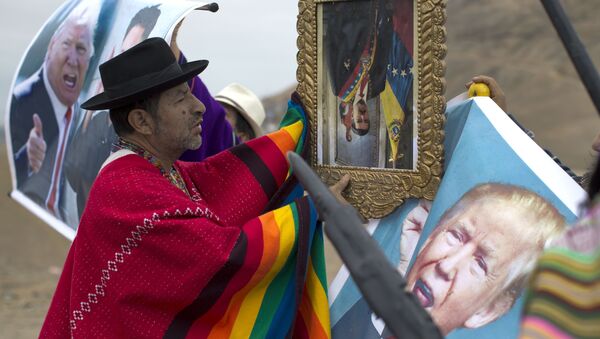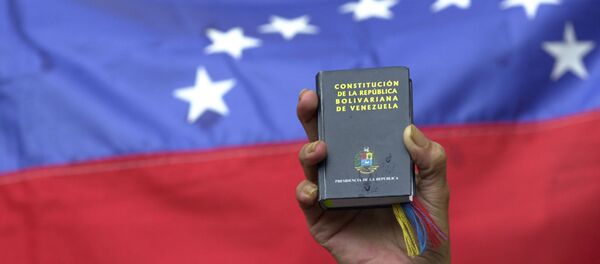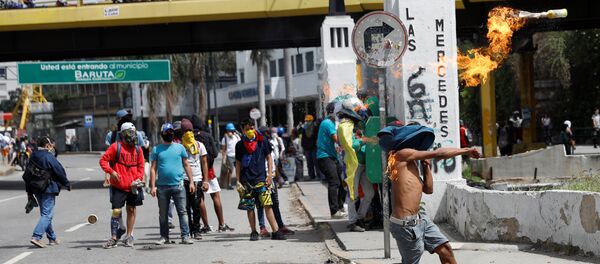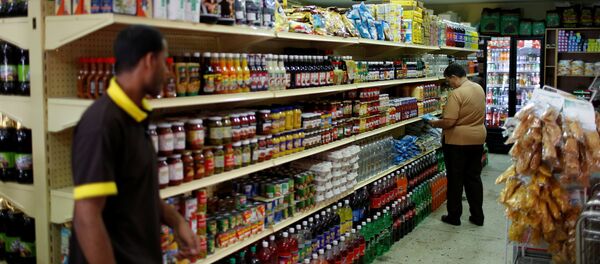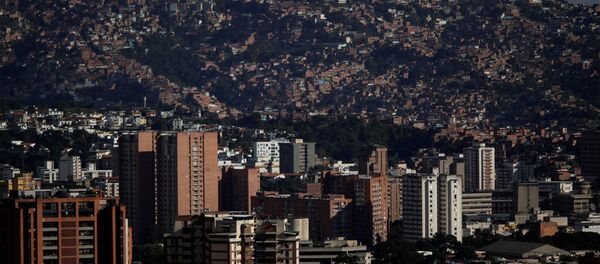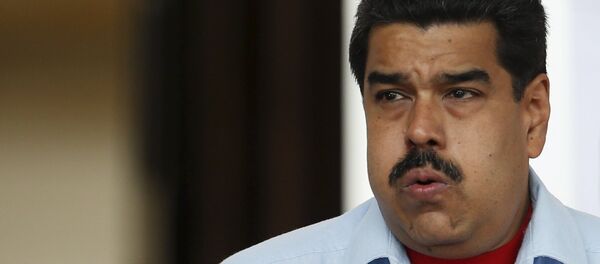MOSCOW (Sputnik) — Few people in Venezuela are likely to be convinced by the government’s interpretation of the US warning of sanctions over apparent attempt to change constitution amid mass protests as a viable foreign threat, but the country’s citizens may still suffer from the punitive measures indiscriminately, experts told Sputnik.
FOREIGN THREAT FITS INTO GOVERNMENT NARRATIVE
Last week US President Donald Trump vowed to consider "strong and swift economic actions" if Venezuela makes good on its plan to convene a constituent assembly with the power to "rewrite" the Constitution. Later last week reports emerged that the US administration was working on sanctions against senior Venezuelan government officials and that Washington could be considering more sweeping measures such as sectoral sanctions, in particular, energy and Venezuela’s state-run oil company PDVSA.
"Unfortunately, President Trump’s threat of economic sanctions to Venezuela plays perfectly into President Maduro’s script. Maduro’s discourse –and his spokesmen- has been to blame the economic and political crisis the Venezuelan people are facing on "imperialist forces" – namely the United States and the region’s right-wing militants," Erika de la Garza, program director of the Latin America Initiative at Rice University's Baker Institute, told Sputnik in an email.
According to Dany Bahar, a fellow at the Brookings Institution's Global Economy and Development program and an associate at the Harvard Center for International Development, the United States' sanction threats may inadvertently fit into the Venezuelan government’s narrative "that the whole world is against them … and that the whole world but them is responsible for the economic crisis."
Bahar told Sputnik that the Venezuelan government could use the discussion of sanctions to divert attention from other issues, but few are convinced.
"From reading … social media and so on, I don’t think that people are buying this anymore… So, you know, how many people can you convince that the imperialism is the one, the United States is the one behind all the crisis? Maybe another 2 percent, 1 percent, you know, it’s not a game-changer," Bahar said.
The dilemma is, that while Washington wishes to influence the government, the sanctions may impact a large number of Venezuelans, and do little to persuade the government.
"As history has shown, economic sanctions don’t differentiate between governments and civilians. Economic sanctions on Venezuela, like the U.S. embargo on Cuba, would not necessarily bring a change in government or punish the country’s leaders without unquestionably hurting the already afflicted Venezuelan people," de la Garza pointed out.
NEGOTIATING WITH CARACAS
"To avoid more bloodshed and what could turn into wide-spread violence, Venezuela’s neighbors and the international community as a whole should push for a negotiated solution. As suggested in a recent report by the International Crisis Group, they should put together a group of 4 to 6 countries including two or more allies of the Venezuelan government to help negotiate a way out of this gridlock," the expert said.
However, the international community may not be able to do anything to persuade Caracas to cancel the Constituent Assembly vote on Sunday, according to Bahar.
The expert stressed that the current government was too entrenched in its beliefs to succumb to outside influence. According to him, the international community may have few options available once the vote is in.
"Venezuela is going to be another Venezuela on Monday. What happens after that is full of uncertainty … The international community will also find itself without a lot of leverage," Bahar said.
CUBA WITH OIL
"Most Latin American countries are really capable of pushing and pressing Venezuela… to change its course … They have some success, but it hasn't been … unanimous … There are a few Caribbean islands, which are very small in terms of population but are very large in terms of the number of countries that still support Maduro on the diplomatic front. And they have really stopped the OAS from taking further action," Bahar said.
Caracas announced its intention to withdraw from the OAS in April, amid deepening protests. The withdrawal process takes two years. The protest rallies began over the country’s Supreme Tribunal of Justice attempt to take over the powers of the National Assembly controlled by the opposition. The decision was overturned, but the protests continued, with over 100 people killed in the ensuing violence.
The sanctions, if imposed, would exasperate an economy that is already struggling. Earlier in July, the government prolonged the economic state of emergency for 60 days. The country’s opposition blames the government for the worsening economic situation.
According to Bahar, the US sanctions could profoundly impact the Venezuelan economy, since the United States is an important trading partner, in particular, in the energy sector.
"Venezuela exports a lot of heavy oil and it relies on the refineries that are in the US … And also, Venezuela, because it has very heavy oil, it relies on dilutants… A lot of the dilutants, they come from the US, too," Bahar said.
"Venezuela is going to be isolated from the world. That’s Cuba, … North Korea. That’s the direction it’s going," Bahar said, adding that Venezuela could become "Cuba with oil."
Cuba and the United States restored diplomatic ties in 2015 after over four decades of lack of communication. However, Washington has not lifted the economic sanctions it holds over them yet.
At the moment, Caracas appears fully intent on proceeding with the Sunday vote despite an informal vote that was organized by the country's opposition on July 16 and in which over seven million Venezuelans reportedly cast their ballots, overwhelmingly against the Constituent Assembly. The opposition called for a general strike on Wednesday and Thursday.

